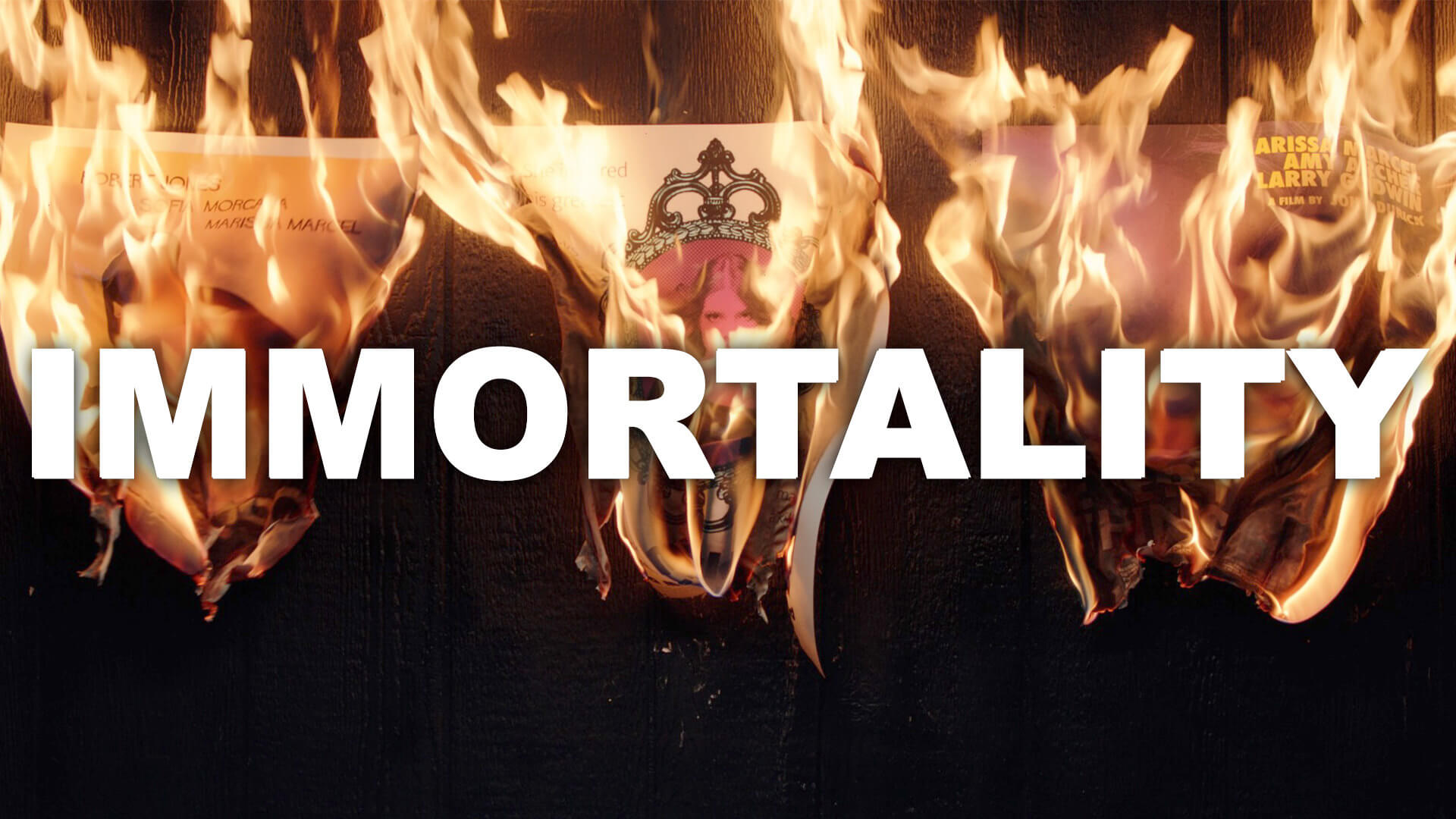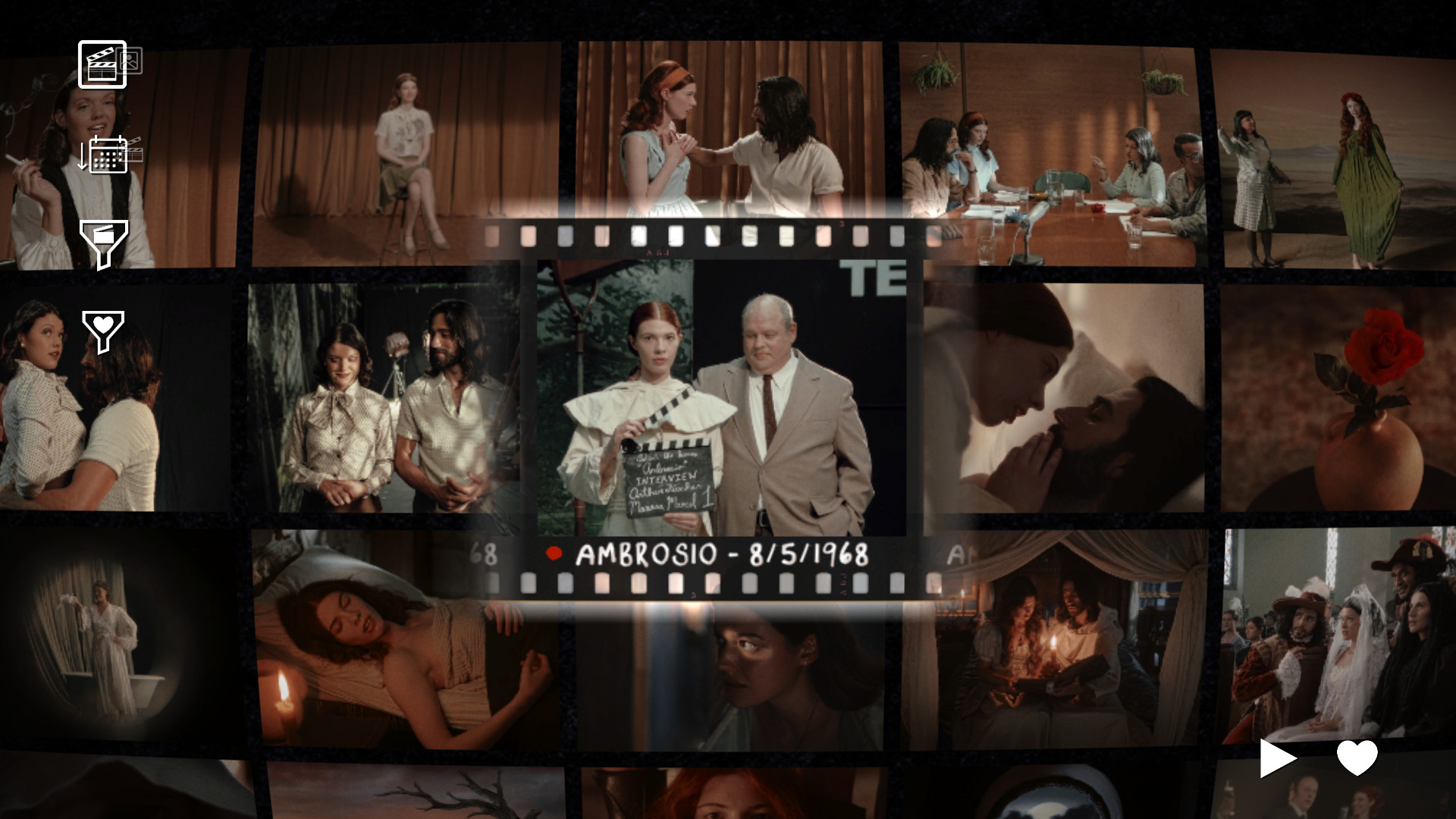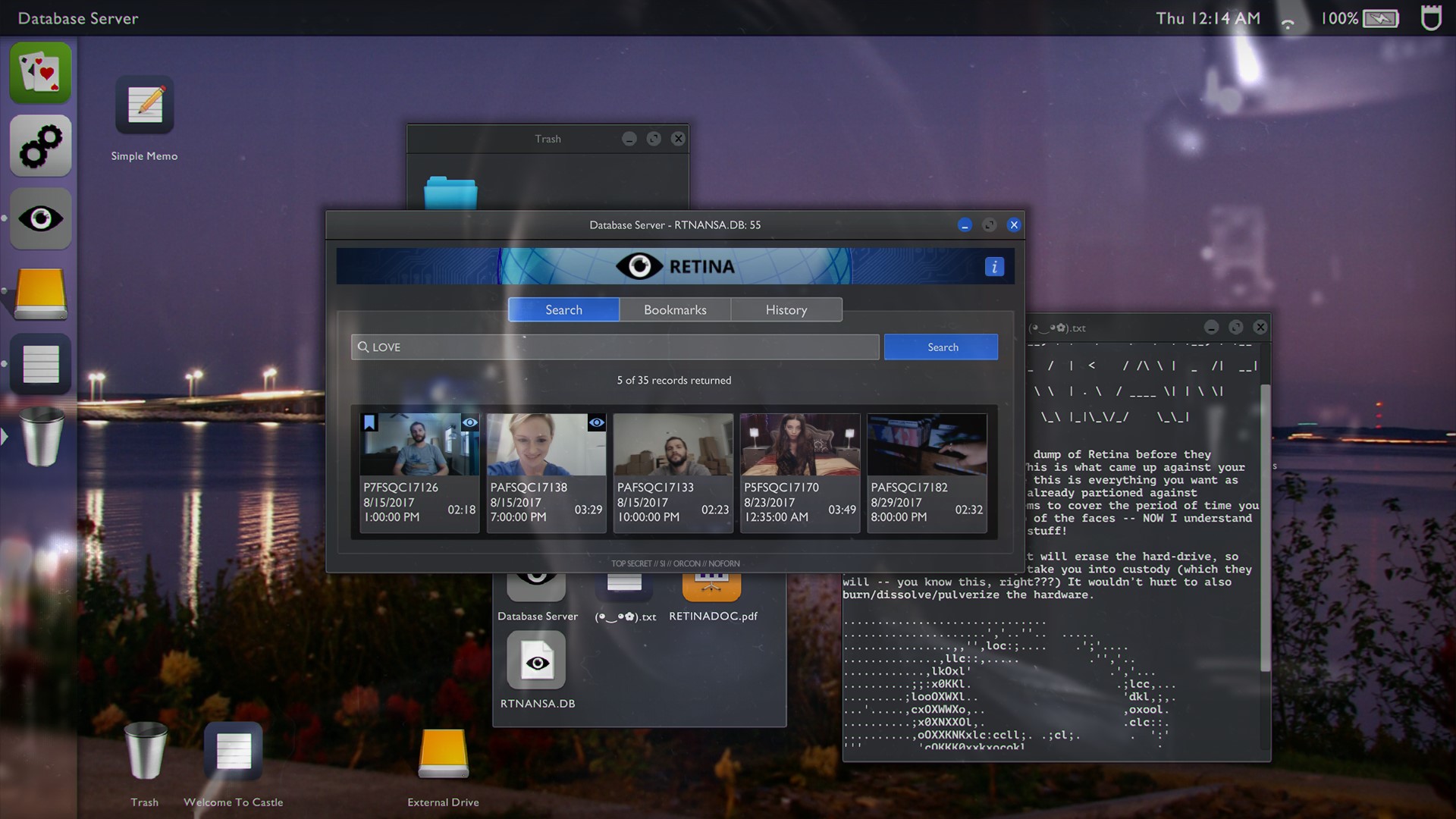
An Interview With Immortality’s Sam Barlow and Natalie Watson
A few minutes into playing Immortality, my controller vibrated and the sound distorted. Marissa Marcel and Carl Goodman were shooting an interrogation scene in Minsky and something was off. I replayed the scene, felt the controller vibrate again, and nervously rewound the scene slowly. Suddenly, Marissa and Carl were gone and there was a strange, sickly woman sitting alone in the interrogation room with a cigarette. Startled, I backed out of the scene.
That’s where the horror began for me in Immortality, the latest live-action interactive movie game by Sam Barlow, creator of Her Story and Telling Lies. Where his previous live-action games were more mystery-thrillers, Immortality is a full horror tale. What happened to enigmatic actress Marissa Marcel, who made three provocative movies that never got released? Why was Marissa the same age in the late 1960s as she was in the late 1990s? And who is that woman that keeps appearing out of nowhere?
I had the pleasure of speaking with Sam Barlow and producer Natalie Watson (formerly of Waypoint) about this dark, thought-provoking title. This interview assumes you’ve played through Immortality and talks full spoilers, so if you haven’t, go experience it for yourself and then come back for some insights.
Natalie, this was the first game you worked on.
Watson: This is my first video game. It’s super crazy. I had no idea what to expect. But honestly, I think a lot of previous production experience at Waypoint lent itself to working with Sam. It was the kind of situation where I was learning things every day but following my instincts and my gut helped. There was an intuitiveness that came really naturally to me. I don’t think I’ve had an experience where I was thrust into something unknown and then realizing I do have these skills coming out.
And you were working with actors, not doing voice work or motion capture.
Watson: It lends itself to how I typically engage with people. I think there’s so much that just felt natural. I’m comfortable here, I’m in my element, and the entire cast and crew was so in it to make this “art thing.” Everyone truly loved the story. I was sort of the lorekeeper on set, so people would ask me questions.
Sam, what was it like directing these actors?
Barlow: For me, getting into the live action world always came from a place of the actors being integral. Even when I was doing more traditional games, I worked with great voice directors and then directed myself. Voice acting is crazy because there’s no rehearsals. But even motion capture is different. It’s fascinating. Trying to do a story-driven video game with characters in it is very hard without a performance. It usually starts out with a restriction. With Gone Home, it’s an indie game, they couldn’t have lots of characters, so it was an empty house. But they had to add the voice over to give it a sense of humanity. So when Her Story fell into place, I said I could still have a character and have a higher fidelity of performance than CGI. When you’re directing live action or making a game, the job of the director is to say, what is the POV on this? So talking to the actors, you’re talking about it from a character level.

Talk about casting Immortality, especially Manon Gage as Marissa Marcel. She was right out of drama school!
Barlow: When I finish these projects I look back and get terrified because I realize, in retrospect, oh, if these actors hadn’t worked out, this whole thing would not work. I always look back and I’m like, oh my god, I just lucked out getting these actors. When you go out with the casting, there are some actors who [aren’t interested]. I think there are some actors who start to get excited. It tends to be actors who have a theatrical background, where they do all this TV and movie work, and miss the intensity of the theater. It’s also attractive because they’re sprawling and big, so even if you’re not the lead you might end up having more than a movie’s worth of material. Casting Marissa Marcel, there was a tricky balance of getting someone who would sell the idea that this was a fresh actress. Manon has gone through hardcore education and training and has a lot of natural ability.
How about Charlotta Mohlin, who plays The One? It must be hard because she couldn’t say she was in the game!
Watson: Once they see her, it’s impossible to not want to talk about her.
Barlow: And reviews are good because they can say she’s good and that’s all they’ll say. When we were originally talking to casting people and describing what we wanted out of the character, I realized how much typecasting goes on in Hollywood. Initially, they sent a lot of actors who do “creature acting” but the point of this character was the emotional core. She expresses more. There’s a thread throughout the whole game about what it means to have the characters looking at the audience. Fifty percent of what this character needs to do is have that spark and intensity. I’ll be honest — we massively lucked out with Charlotta. Someone was on our side when we found her. It’s a very demanding role.

Let’s talk about the horror of the game. What kind of horror is this?
Barlow: When I did Silent HIll: Shattered Memories, there was an expectation around what horror meant in gaming. My take with Shattered Memories was that my favorite horror movies are quite sad and moving. And the things that scare me the most are not necessarily big, horrific monsters, but the fact that we all die sad and alone. All my games have been about identity. It’s scary that the people we’ve known for decades are unknowable to us. I think horror is uniquely a genre that lets us address these interesting topics. As a kid I was obsessed with surrealism and metaphors. And with horror, you make the metaphor real. For Immortality, one of the starting points was, how does it feel if a piece of footage misbehaves slightly?
What is the scariest part of the game for each of you?
Watson: I think, for me, the most horrific things are where our observational role is heightened. Where you feel yourself sitting in the camera as a watcher to something particularly intense.
Barlow: There are scenes to me that are the saddest. The ones where characters are disappointed or realize that things are more difficult than they thought.
This game has been called Lynchian. Is that a compliment or is it reductive?
Barlow: A lot of people self-identify as Lynchian. I’ve seen game pitches where they say it’s like a David Lynch thing and it’s nothing like that. So it scares me to even reference Lynch in that sense. What’s cool about Lynch is how he makes me feel, the intensity, the uniqueness of his voice.
Immortality also has explicit sexual content. Talk about the importance of the intimacy coordinator.
Watson: We had this incredible intimacy coordinator Jean Franzblau, who was able to communicate between us and the actors. She advocated for both the actors and the directorial, creative vision. She wove that together beautifully. Sam took the time before shooting to have long calls with everyone. Everyone recognized how integral the scenes were to each character’s story. They weren’t gratuitous. Sam took the time to design the game and write the script in a way where everything felt purposeful and that the characters would come out of these scenes with something to say about it or some sort of follow-through. It was one of our highest priorities throughout the shoot. They’re some of the beautiful, most striking and sometimes most horrific scenes we shot.
Immortality is out now.



